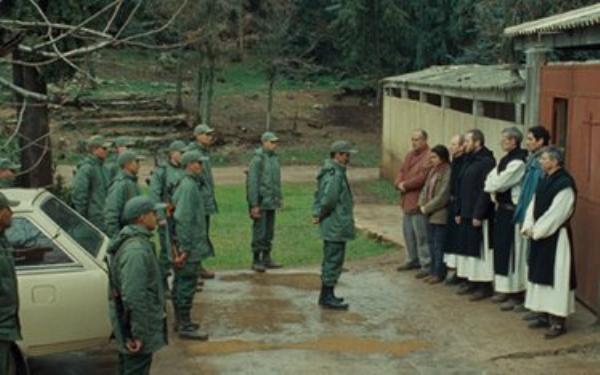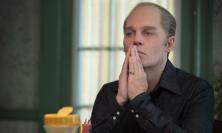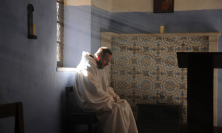The first of the virtues that we will be exploring in our Lenten series, ‘Virtues on Film’, is fortitude. In 2010, Xavier Beauvois directed the extraordinary and powerful Of Gods and Men, in which Niall Keenan sees moving and challenging examples of courageous choices. How can we emulate the courage of the monks of the monastery of Notre Dame de l’Atlas?
On the night of 26–27 March 1996, seven French Cistercian monks were kidnapped from their monastery in the Atlas Mountains in Algeria. They were found dead on 21 May 1996. In 2010, the director Xavier Beauvois turned the last year or so of their lives into the film Des Hommes et Des Dieux (‘Of Gods and Men’), which won numerous prizes including the Grand Prix at Cannes. But who were these monks? And what do their lives, as portrayed in this film, have to say to us about the cardinal virtue of courage, or fortitude, this Lent?
The French had invaded Algeria in 1830. As a colonial power they brought with them their language, culture, government and the Christian religion. Blessed Charles de Foucauld had lived and died there. When Algeria gained independence in 1962, traces of French influence were left behind, including the Cistercian monastery of Notre Dame de l’Atlas at Tibhirine. The monastic community was French and, at the time at which the film begins, it numbered about eight members. They had lived under the independent Algerian government quietly and prudently for many years, working the land, and developing close links with the surrounding Muslim population. A village had grown up around the monastery, and with it a high level of mutual understanding, cooperation and respect. Many villagers were employed by the monks and the monks cared for the locals, most explicitly through the ministrations of the elderly Frère Luc (played by the veteran French actor, Michael Lonsdale), a doctor as well as a monk, who saw many patients each day. All of this is shown very beautifully in the film. Luc is shown in his clinic, at a local celebration in the village with some of his monastic brothers, and listening and giving advice to a young woman from the village; he talks about his vocation when she asks if he has ever been in love: ‘Several times, yes. And then I encountered another love, even greater. And I answered that love. It’s been a while now. Over 60 years.’
The prior, Père Christian de Chergé had a particular relationship with Algeria, although the film does not show this background. Born in 1937, he had lived there for three years as a child. As a young man he had done his national military service during the Algerian War of Independence (1954-1962). During this he had been rescued from rebels who intended to kill him by an Algerian friend, a local police officer; two days later, the policeman was found with his neck cut. Henceforth he felt a profound allegiance to Algerian soil, as one of its sons had laid down his life for him. From a military and aristocratic family, a linguist and intellectual by nature, Père Christian had studied the Arabic language, the Islamic faith and the Koran, and was intimately familiar with the cultural milieu of his surroundings. He is portrayed in the film by Lambert Wilson as a man of profound prayer and spiritual conviction, uncompromising and with a confidence in the higher purpose behind his actions.
The film is accurate to life: the actors are even chosen for their similarity in appearance to the original monks and it is filmed in the beautiful Atlas Mountains. Much of the film shows the Cistercian community living the simple monastic life. We are with them in the Chapel, chanting the Psalms, celebrating the Eucharist, praying in deep silence; and also working, eating and talking together. The viewer is drawn into the monastic culture perhaps even more powerfully than in the documentary, Die Große Stille (‘Into Great Silence’). We see the love and care that exists between the brothers. One senses the deep joy that each monk finds in the monastic life, and most particularly in that particular place. This is important because when danger threatens and the option of leaving is discussed, the monks feel bound to Notre Dame de l’Atlas because of their vow of Stability, enjoined by St Benedict on Benedictines and Cistercians, meaning perseverance in the monastic life in a particular monastery.
Then, as now, Algeria was in turmoil. The Algerian Civil War (1995-2002), fought between the Algerian Government and various Islamist groups, cost between 50,000 and 200,000 lives. Intimations of unrest far off reach the monks: the villagers complain that a girl, a relation, has been stabbed to death on a bus for not wearing the hijab. But the trouble is brought much closer to home when a group of Croatian builders working locally have their throats cut. The government demands that an armed guard be placed on the monastery. Père Christian refuses – a Christian monastery should not be guarded by arms. But when the local rebel chief, Ali Fayattia, raids the monastery, the danger to the monks becomes acute. And it is in the context of this danger that we start to see real courage. Christian, in a very powerful scene, faces down Fayattia. He insists that arms may not be brought into the monastery, a ‘house of peace’. He talks to Fayattia outside, and refuses his demands to hand over medication. When Fayattia asserts that Christian has no choice, the monk replies: ‘Yes, I have a choice’. And after this small yet significant victory, he tells Fayattia that this night is different from all others, as on this night they celebrate the birth of the Prince of Peace, Sidna Aïssa (Lord Jesus): it is Christmas Eve.
In the community, opinions are divided about whether to remain at Tibhirine or not. We see the monks at a Chapter meeting discussing how they should respond to the violence around them. Several are for returning to France. Their meditations make up a large part of the more reflective sections of the film: they think and pray; they meet with the Prior. Ultimately, in a series of profoundly moving sequences, each monk makes an individual decision that he wishes to remain in Algeria. Their words have great power: ‘To leave is to run away’; ‘The Good Shepherd doesn’t abandon his flock to the wolves’; ‘since when do we yield to arms?’; ‘To leave is to die’ ;‘our mission here is not yet finished’; ‘The disciple is not above his master, this is no time for me to stray’. One monk, Christophe’s, struggle is more acute than that of his brothers. We see him alone in his cell at night, screaming at God. He meets the Prior and asks: ‘Dying here, here and now, does it serve a purpose?’ Christian replies: ‘It’s true that staying here... is as mad as becoming a monk. Remember, you’ve already given your life. You gave it by following Christ, when you decided to leave everything, your life, your family, your country.’ Again he asks: ‘Why be martyrs? For God? To be heroes? To prove we’re the best?’ ‘No, no, no,’ comes the reply, ‘we’re martyrs out of love, out of fidelity. If death overtakes us, despite ourselves... our mission here is to be brothers to all. Remember that love is eternal hope. Love endures everything.’ Christophe breaks down, embraces Christian, asks pardon and ultimately has the courage to say, ‘Let God set the table here for everyone, friends and enemies’. Frère Luc’s approach is more simple: ‘I’m not scared...Je suis un homme libre’; yet when he is alone we see him tenderly kissing the wound in Jesus’s side.
Of Gods and Men is a very visual film and this contains much of its power. There is frequent allegory. Christian holds on to a huge and strong tree. Like a shepherd he walks among his flock. He watches migrating birds flying away. He prays, looking up to God, as rain pours down on him from above. One scene with the dead Fayattia is a stunning visual tableau, echoing Mantegna’s ‘Lamentation over the Dead Christ’. And finally there is the ‘last supper’, one of the most powerful scenes in any religious film ever made. Like the apostles, knowing that death is close, the brothers sit down to dinner together. Unusually, Frère Luc brings out bottles of good red wine. The brothers drink in silence as music from Swan Lake is played. And gradually each one is overwhelmed with the sense that they are going to die but that they are at peace, that they have come through the doubts and the testing, and tears of joy flow down their cheeks.
It is here perhaps that we should ask the question: what is courage, or fortitude? It, along with prudence, temperance and justice is one of the cardinal virtues. These were defined by Plato (424-348BC) in The Republic (427e). Cicero (106-43BC) refers to them, and they are mentioned in the Book of Wisdom (8:7). They were first referred to as cardinal virtues by St Ambrose (c.330-397) from the Latin cardo or hinge, as they were seen as the hinges on which the door of the moral life swings. They were discussed by St Augustine (354-430), but today they are perhaps most associated with St Thomas Aquinas (1225-1274) who discusses them in detail in the Summa Theologica II(I).61; referring to courage or fortitude he says: ‘For the need of putting the order of reason into the passions is due to their thwarting reason: and this occurs in two ways.... Secondly, by the passions withdrawing us from following the dictate of reason, e.g. through fear of danger or toil: and then man needs to be strengthened for that which reason dictates, lest he turn back; and to this end there is “Fortitude.”’. What is the role of courage for the Christian today? What do the Atlas Martyrs and the film Of Gods and Men teach us about this virtue?
To the eyes of the world their actions were sheer madness. They chose to remain in an incredibly dangerous situation with no hope of personal gain and with a very clear route of escape. And yet their resolution was clear. They stayed because, as several of them stated both in reality and in the film, they wished to give witness to the truth of the Christian faith, to remain in solidarity with their fellow citizens, albeit not Christian, in a spirit of love of God and neighbour. They also refused to be intimidated by the threat of violence, indicating that their own safety was subordinate to the principles to which they were witnesses.
Courage, or fortitude, in this context means moral strength in the face of strong opposition. It means attending to one’s duty, seen as God’s will, no matter what the consequences. Christian de Chergé and his companions were not asked to affirm their faith in Christ explicitly, but they did so implicitly by refusing to run away from what they perceived as God’s will for them, in the context of monastic vows and religious obedience. We are perhaps more familiar with the stories of those who demonstrate witness to their faith when they are asked to deny it: this was the situation of the early Roman martyrs; Catholic martyrs in the Reformation were offered life if they would deny their faith; and the Jesuit martyrs in Japan were asked merely to place their foot on the Cross for their lives to be saved (c.f. Shusaku Endo’s Silence). In our own time matters are more complicated. We might hear of the deaths of missionary priests and religious taking place in the context of a robbery or some such, and the religious or priest is killed just because they happen to be there. No denial of their faith has been asked of them; the key point is that they are there. Such was the case with the monks of Notre Dame d’Atlas.
Seen in this light courage is best understood as not running away, at least as regards a physical place. But what about for us who are not in harm’s way? The same principle of not running away surely applies; it is the context that is different. It is for each of us to consider what it is that we are tempted to run away from. Perhaps most of us will immediately think of our moral duties as Christians and occasions on which we have failed to uphold them: not speaking up on behalf of a bullied colleague; following the crowd in our thoughts, speech, actions; not witnessing to the Gospel of Life when such things are discussed among friends or in the workplace. But examples that are less dramatic are also important – perhaps examples that pertain more to faith than morals: the courage to truly believe that everything is in God’s hands no matter how bad things may seem; the courage to pray, or mention God, even at home; the personal courage to offer our lives to the Lord without reserve, attending to the words of the Master: ‘Follow me’.
Of the nine monks who were present at Tibhirine when the raid happened, seven were captured and killed in circumstances that even now remain obscure. Yet two of the brethren survived, as did Père Christian’s testament, written to be opened only in the case of his death:
Should it ever befall me, and it could happen today, to be a victim of the terrorism swallowing up all foreigners here, I would like my community, my church, my family to remember that my life was given to God and to this country.
And to his murderer:
And you too, friend of the last minute, who knew not what you were doing. Yes, to you as well I address this thank-you and this farewell which you envisaged. May we meet again, happy thieves in Paradise, if it pleases God, the Father of us both. AMEN! INCHALLAH!
Niall Keenan is a member of the Thinking Faith editorial board.
![]() Read Thinking Faith’s review of Of Gods and Men
Read Thinking Faith’s review of Of Gods and Men
‘Virtues on Film’ on Thinking Faith:
 The Saving Power of Christian Virtue in The Lord of the Rings by Catherine Hudak Klancer
The Saving Power of Christian Virtue in The Lord of the Rings by Catherine Hudak Klancer
 Prudence in Star Trek by Simon Potter
Prudence in Star Trek by Simon Potter
 Faith in High Noon by Karen Eliasen
Faith in High Noon by Karen Eliasen
 Justice in A Royal Affair by Nathan Koblintz
Justice in A Royal Affair by Nathan Koblintz
 Caritas in Quartet by Quentin de la Bédoyère
Caritas in Quartet by Quentin de la Bédoyère
 Hope in Life is Beautiful by Frances Murphy
Hope in Life is Beautiful by Frances Murphy






